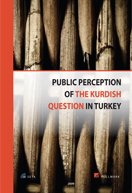This article considers the August 2008 visit to Turkey by Iranian President Mahmoud Ahmedinejad, and analyzes relations between Turkey and Iran in general. The tensions and crises that followed the 1979 Iranian Revolution are briefly presented in order to provide a better understanding of the present state of relations. Then we draw a picture of the situation after the Justice and Development Party (AKP) came to power in 2002, bringing widespread changes to Turkish foreign policy. We also call attention to Turkey’s changing role in the regional balance of power, and to the significance of that role both in Turkey’s relations with Iran and with the United States.
On July 13, 2007, there was perhaps a single political item on Turkey’s agenda: the general elections that would be held some 10 days later. The Justice and Development Party (AKP) government that had governed the country since the end of 2002 had initiated early elections following a series of turbulent developments. Turkish citizens and the world at large waited impatiently for the outcome of the polls. Just at that moment, a statement by Hilmi Güler, the Minister for Energy, made ripples in Washington-Ankara relations. Washington was disturbed by Güler’s declaration that Turkey had signed an agreement with Iran to send Turkmen gas over Iranian oil in order to reach Turkey and, from there, to Europe. Circles close to the AK Party met the statement with applause.
The Country Officially Declared a Threat In debates about Turkey-Iran relations, the argument is often raised that the two countries have not experienced any crisis since the Treaty of Kasr-ı Şirin in 1638. This is indeed true, yet we have to keep in mind the fact of an ongoing regional competition between the two countries. Before turning to this competition, however, it is necessary to remember an important crisis in the recent history of Turkish-Iranian relations in order to analyze what is happening today.
Many countries in the region perceived the Islamic Revolution of 1979 as a serious threat with many possible ramifications for the region. Turkey did not have much time to discuss this threat as the Turkish military took control shortly after on 12 September 1980. Iran became the focus and often the culprit for two important agenda items in Turkey during the 1990s: First was the accusation that Iran supported the Kurdistan Workers’ Party (PKK) that carried out terrorist acts against Turkey. Second, Iran was suspected of supporting Islamic movements in the country, usually referred to as the “exportation of the revolution.” Tensions between the two countries increased with the claims that Iran was behind several political assassinations in Turkey.
The Welfare Party and its leader, Necmettin Erbakan who became a partner in the coalition government in 1996, were keen on improving relations with Iran. The first official visit by Erbakan was to Iran. Turkey signed a natural gas agreement with Iran during his a year long government. Trade relations were growing as well. All these developments made Iran a contentious factor in domestic political debates.
Most interestingly, Iran was defined by Turkey as a threat in the 28 February 1997 ultimatum drafted by the military that paved the way for ousting the Erbakan government. The coalition government in which Erbakan’s party was the major partner was shortly dissolved. The Constitutional Court duly closed the Welfare Party and its successor, the Virtue Party. Tensions grew in Turkey’s relations with Iran in the wake of these events, as Tehran did not appoint an ambassador to Turkey for quite some time.









